Notes on the Family History of the Rices
by Leona Evelyn Rice Crawford
The people whom I can claim for ancestors came from
varied places and came with different skills.
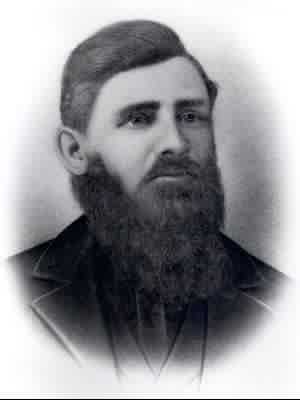 My
father claimed to be English, Irish, Spanish, and Welsh and my mother claimed
to be English and Pennsylvania Dutch though what other groups they may
have a "trace of" only our Good God knows. My Father's mother's parents
both came from Ireland (and census records affirm this). Her Father
was a Clements and her mother was a Fisher. At what age they arrived
in America or if they were married when they came is not known. But
they were married in 1850 and were living in Raynsborough (now Rainsboro)
Ohio, Highland County. In the 1860 census my Grandmother (Lizzie
Clements) Rice was recorded as being one of their children. It was
Elizabeth then, but their marriage license (at Lyndon, Kansas, Courthouse
record) shows that she was "Lizzie" when she married. She was
My
father claimed to be English, Irish, Spanish, and Welsh and my mother claimed
to be English and Pennsylvania Dutch though what other groups they may
have a "trace of" only our Good God knows. My Father's mother's parents
both came from Ireland (and census records affirm this). Her Father
was a Clements and her mother was a Fisher. At what age they arrived
in America or if they were married when they came is not known. But
they were married in 1850 and were living in Raynsborough (now Rainsboro)
Ohio, Highland County. In the 1860 census my Grandmother (Lizzie
Clements) Rice was recorded as being one of their children. It was
Elizabeth then, but their marriage license (at Lyndon, Kansas, Courthouse
record) shows that she was "Lizzie" when she married. She was 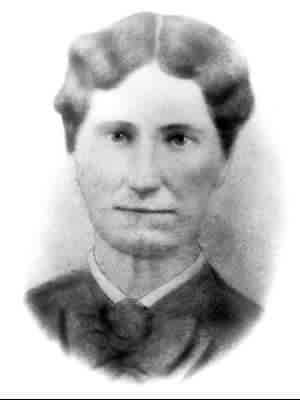 a
short, more than pleasingly plump lady. I was only 1 1/2 years old
when she died, but my sister, Fern, 11 years older than I, says that she
taught her how to crochet, embroidery, how to cook a little and was a wonderful
Grandmother. Her parents had left Highland County Ohio and came to
Kansas when my Grandmother was a young woman. They had a home near
Williamsburg. My grandfather bought a farm between Williamsburg and
Pomona and, well, as the young will, they found each other and married
at Lyndon in 1881 and started and reared a family.
a
short, more than pleasingly plump lady. I was only 1 1/2 years old
when she died, but my sister, Fern, 11 years older than I, says that she
taught her how to crochet, embroidery, how to cook a little and was a wonderful
Grandmother. Her parents had left Highland County Ohio and came to
Kansas when my Grandmother was a young woman. They had a home near
Williamsburg. My grandfather bought a farm between Williamsburg and
Pomona and, well, as the young will, they found each other and married
at Lyndon in 1881 and started and reared a family.
My father's great grandfather Rice is said to have been
a Welshman who was thrown into an English debtors prison when he was quite
young. He was apprenticed to a merchant ship to serve out his prison
term. A common practice of the English government at that time.
Why was he in prison? A debt. Why was he in debt and for what?
I don't know, but again it was common practice to put people in prison
for a small (or a large) debt at that time. It is said that he worked
so hard and lived under such filthy conditions that when the ship got to
New Orleans he jumped ship and headed north as fast as he could go.
He found work along the way to keep himself alive and a few years later
he came to Orange County, New York State, where he settled and married.
(Now all this is a family told tail, told to me by various family members,
but I can't verify it. But at least it makes a good story.)
Into this home my father's grandfather, Cornelius Boneparte Rice, was born.
Whether there were other children or not I don't know. When he was
2 years old his parents were "taken by an Epidemic". Was it flu,
small pox, black plague??? I have no idea. It is said that my grandfather
was taken and raised by a family named Munn. When he was 12 years
old, he at least thought being mistreated (what 12 year old doesn't think
he is mistreated), so he ran away from the Munn family and since he was
a tall healthy lad, he got a job as a cabin boy on a freighter and it is
my understanding that it sailed to the West Indies, during which time Cornelius
added the name Boneparte to his name as thru reading and hearing, Napoleon
Boneparte became his hero. After he got back from the West Indies,
he served a tour in some government ship -- was it a Navy, Marines, Coast
Guard?? -- I don't know. He then settled in Georgetown in the District
of Columbia and had a grocery and operated a ferry boat across the Potomac
River (this is verified by the U.S. 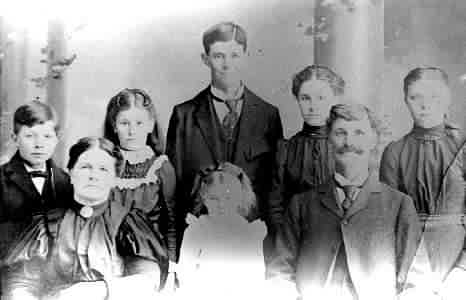 census
of 1850). The Kansas-Nebraska Bill of 1854 gave veterans of the U.S.
Government the right to land in Kansas, so with a wife and a half dozen
or more children, he left his home in District of Columbia and started
for Black Jack in Kansas. He had married Jane Mozingo whose family
lived in Wheeling, Virginia, so they went there first.
census
of 1850). The Kansas-Nebraska Bill of 1854 gave veterans of the U.S.
Government the right to land in Kansas, so with a wife and a half dozen
or more children, he left his home in District of Columbia and started
for Black Jack in Kansas. He had married Jane Mozingo whose family
lived in Wheeling, Virginia, so they went there first.
Now the Mozingo family were an early family of the United
States. They had settled in Eastern Virginia and were said to be
Castilian Spanish. It is recorded in military records that some of
the Mozingoes received Revolutionary War pensions. (According to
1790 records.) My great grandmother Jane Elizabeth Mozingo was either
born in West Moreland county Eastern, Va. or in West Moreland County, Pa,
which is next to Wheeling, (now) W. Va. I talked to a Mozingo from
a phone booth at Wheeling one time (still Mozingo's there) and he said
he thought several families of the Mozingoes came to Wheeling area about
1820. It is said that my great great grandmother had taken her daughter
and son to D.C. so that her daughter, Jane, could go to a music school
there. She met my great grandfather and when love flew in her education
flew out the window.
After visiting with family at Wheeling (they had left
D.C. in March), they purchased a flat boat and sailed down the Ohio River
until it met the Mississippi and then plied the waters up the Mississippi
to St. Louis. In St. Louis they purchased horses and wagons as they
had heard they were hard to get in Kansas, and another flat boat to carry
them on -- then up the Missouri to Westport landing. (Kansas City, Mo)
They then sold the boats and went overland to Blackjack. Blackjack
was just east of Baldwin in what is now Douglas Co. It was July by
then. How did they live that first year there? Could they still
raise a garden? I do not know that. Jane Mozingo's brother
came with them. I do know that he shoed horses (on the Santa Fe Trail
as Black Jack was) for a living. His name was Gideon Samuel Mozingo.
I know she, great grandmother Jane, must have been "some woman" to survive
a journey like that with all 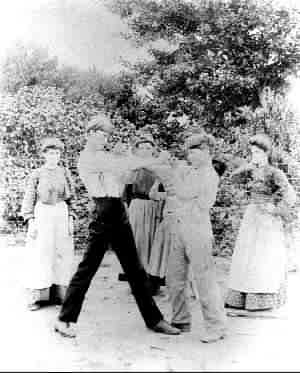 those
children. I think my grandfather was born in Kansas just the next
year after they got there. Uncle Gideon left Kansas at some point
to shoe horses for a wagon train to Santa Fe. He also was a courier
of mail on the Santa Fe Trail, too, and went to Colorado to seek gold.
Fern says he was a gentle old man and died at my grandfather Rice's house
when she was 4 or 5 years old. She remembered him. Great-grandmother's
life must have been an adventure (filled with hardships) after she got
to Kansas, too. The battle of Blackjack (the 1st battle of the Civil
War in Kansas) was in 1856. They arrived in 1857, but skirmishes
between north and south sympathizers occurred regularly throughout the
time till 1864. It is said that one skirmish occurred on my great
grandfather's farm. Men from both sides were wounded. They
were brought to my grandmother's house -- men from both sides -- to be
patched up before taking them home! After the civil war, the Mozingo
family sent an old black man and woman to my great-grandparents to keep
as they had no place to go. The old man and woman had been house
servants
for Jane Mozingo's parents. After the war the young Negroes were
freed and could get work, but old black people were homeless. This
man and woman had been in the Mozingo household all of Jane's life and
so she took them in. They lived in a shed near their house.
It caused friction in the neighborhood. Some wanted them to leave
the area (no
those
children. I think my grandfather was born in Kansas just the next
year after they got there. Uncle Gideon left Kansas at some point
to shoe horses for a wagon train to Santa Fe. He also was a courier
of mail on the Santa Fe Trail, too, and went to Colorado to seek gold.
Fern says he was a gentle old man and died at my grandfather Rice's house
when she was 4 or 5 years old. She remembered him. Great-grandmother's
life must have been an adventure (filled with hardships) after she got
to Kansas, too. The battle of Blackjack (the 1st battle of the Civil
War in Kansas) was in 1856. They arrived in 1857, but skirmishes
between north and south sympathizers occurred regularly throughout the
time till 1864. It is said that one skirmish occurred on my great
grandfather's farm. Men from both sides were wounded. They
were brought to my grandmother's house -- men from both sides -- to be
patched up before taking them home! After the civil war, the Mozingo
family sent an old black man and woman to my great-grandparents to keep
as they had no place to go. The old man and woman had been house
servants
for Jane Mozingo's parents. After the war the young Negroes were
freed and could get work, but old black people were homeless. This
man and woman had been in the Mozingo household all of Jane's life and
so she took them in. They lived in a shed near their house.
It caused friction in the neighborhood. Some wanted them to leave
the area (no 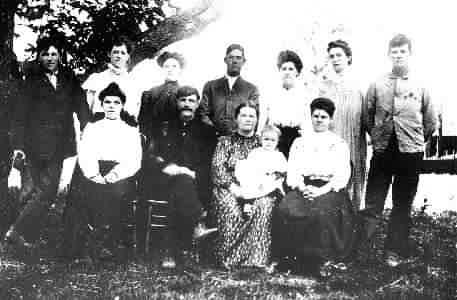 Blacks
allowed). Others felt that my grandparents were keeping slaves.
Within a couple or three years they died. It must have been terrible
for them, the old couple, living in a strange land with not one person
who wanted them except my great grandparents. They were old but I
imagine that their death was hastened by a broken heart. Slavery
is wrong, but in many instances in the South, the slaves became almost
family members. My great grandmother was reported to have said that
from the time she was born this black woman had cared for her.
Blacks
allowed). Others felt that my grandparents were keeping slaves.
Within a couple or three years they died. It must have been terrible
for them, the old couple, living in a strange land with not one person
who wanted them except my great grandparents. They were old but I
imagine that their death was hastened by a broken heart. Slavery
is wrong, but in many instances in the South, the slaves became almost
family members. My great grandmother was reported to have said that
from the time she was born this black woman had cared for her.
At some point my grandparents moved to a farm near Wellsville
in Franklin County. They are buried in Baldwin's Oak Lawn (?) Cemetery
at the south edge of Baldwin. Several of the Rice's family are buried
there including my Grandfather and Grandmother George & Lizzie (Clements)
Rice. Grandpa & Grandma (George & Lizzie) had lived in the
Williamsburg-Pomona area many years after their marriage. They had
2 sets of twins and a boy and a girl who were born singly. Uncle
Lem, the single-born boy, had one single born boy and 2 sets of twins.
None of these twins were identical. My Father, Jesse, was a twin
with a sister, Besse.
In later years Grandpa decided to move west and moved
to Ness County, Ks. on a treeless prairie to a sod house, so different
from the home in Franklin County. I wonder how my Grandmother could
have stood it. My grandfather had a stroke followed by flu and died.
My grandmother died a few years later with a series of strokes. It
had been a very unwise move that had brought heartache to both of them.
I was born in that sod house about 1 1/2 or 2 years before my grandmother
died.
Pictures
-
Cornelius Bonaparte Rice. In this photo he was wearing his glass
eye in.
-
Jane Mozingo Rice
-
Jesse Rice, Lizzie Clements Rice (mother), Besse Rice, Lemual (Lem) Rice
(standing), Irene Rice (in front), Nora Rice, George Lewis Rice, Dora Rice.
-
Left to right: Besse, Lem (Lemuel), Dode (Dora), Irene, Jesse, None (Nora).
The children of George Lewis and Lizzie Rice.
-
Standing, left to right: Jesse Rice, Cathrine Harrison Rice (Jesse's wife),
Besse Rice Hackett, None Rice, Agnes Miller Rice (Lem's wife), Lem Rice.
Sitting, left to right: Dode Rice, George Lewis Rice (father), Elizabeth
Hackett (Homer & Besse's daughter), Irene Rice. This photo was taken
in May or June of 1909. This date was provided by Leona Rice Crawford.
 My
father claimed to be English, Irish, Spanish, and Welsh and my mother claimed
to be English and Pennsylvania Dutch though what other groups they may
have a "trace of" only our Good God knows. My Father's mother's parents
both came from Ireland (and census records affirm this). Her Father
was a Clements and her mother was a Fisher. At what age they arrived
in America or if they were married when they came is not known. But
they were married in 1850 and were living in Raynsborough (now Rainsboro)
Ohio, Highland County. In the 1860 census my Grandmother (Lizzie
Clements) Rice was recorded as being one of their children. It was
Elizabeth then, but their marriage license (at Lyndon, Kansas, Courthouse
record) shows that she was "Lizzie" when she married. She was
My
father claimed to be English, Irish, Spanish, and Welsh and my mother claimed
to be English and Pennsylvania Dutch though what other groups they may
have a "trace of" only our Good God knows. My Father's mother's parents
both came from Ireland (and census records affirm this). Her Father
was a Clements and her mother was a Fisher. At what age they arrived
in America or if they were married when they came is not known. But
they were married in 1850 and were living in Raynsborough (now Rainsboro)
Ohio, Highland County. In the 1860 census my Grandmother (Lizzie
Clements) Rice was recorded as being one of their children. It was
Elizabeth then, but their marriage license (at Lyndon, Kansas, Courthouse
record) shows that she was "Lizzie" when she married. She was  a
short, more than pleasingly plump lady. I was only 1 1/2 years old
when she died, but my sister, Fern, 11 years older than I, says that she
taught her how to crochet, embroidery, how to cook a little and was a wonderful
Grandmother. Her parents had left Highland County Ohio and came to
Kansas when my Grandmother was a young woman. They had a home near
Williamsburg. My grandfather bought a farm between Williamsburg and
Pomona and, well, as the young will, they found each other and married
at Lyndon in 1881 and started and reared a family.
a
short, more than pleasingly plump lady. I was only 1 1/2 years old
when she died, but my sister, Fern, 11 years older than I, says that she
taught her how to crochet, embroidery, how to cook a little and was a wonderful
Grandmother. Her parents had left Highland County Ohio and came to
Kansas when my Grandmother was a young woman. They had a home near
Williamsburg. My grandfather bought a farm between Williamsburg and
Pomona and, well, as the young will, they found each other and married
at Lyndon in 1881 and started and reared a family.
 census
of 1850). The Kansas-Nebraska Bill of 1854 gave veterans of the U.S.
Government the right to land in Kansas, so with a wife and a half dozen
or more children, he left his home in District of Columbia and started
for Black Jack in Kansas. He had married Jane Mozingo whose family
lived in Wheeling, Virginia, so they went there first.
census
of 1850). The Kansas-Nebraska Bill of 1854 gave veterans of the U.S.
Government the right to land in Kansas, so with a wife and a half dozen
or more children, he left his home in District of Columbia and started
for Black Jack in Kansas. He had married Jane Mozingo whose family
lived in Wheeling, Virginia, so they went there first.
 those
children. I think my grandfather was born in Kansas just the next
year after they got there. Uncle Gideon left Kansas at some point
to shoe horses for a wagon train to Santa Fe. He also was a courier
of mail on the Santa Fe Trail, too, and went to Colorado to seek gold.
Fern says he was a gentle old man and died at my grandfather Rice's house
when she was 4 or 5 years old. She remembered him. Great-grandmother's
life must have been an adventure (filled with hardships) after she got
to Kansas, too. The battle of Blackjack (the 1st battle of the Civil
War in Kansas) was in 1856. They arrived in 1857, but skirmishes
between north and south sympathizers occurred regularly throughout the
time till 1864. It is said that one skirmish occurred on my great
grandfather's farm. Men from both sides were wounded. They
were brought to my grandmother's house -- men from both sides -- to be
patched up before taking them home! After the civil war, the Mozingo
family sent an old black man and woman to my great-grandparents to keep
as they had no place to go. The old man and woman had been house
servants
for Jane Mozingo's parents. After the war the young Negroes were
freed and could get work, but old black people were homeless. This
man and woman had been in the Mozingo household all of Jane's life and
so she took them in. They lived in a shed near their house.
It caused friction in the neighborhood. Some wanted them to leave
the area (no
those
children. I think my grandfather was born in Kansas just the next
year after they got there. Uncle Gideon left Kansas at some point
to shoe horses for a wagon train to Santa Fe. He also was a courier
of mail on the Santa Fe Trail, too, and went to Colorado to seek gold.
Fern says he was a gentle old man and died at my grandfather Rice's house
when she was 4 or 5 years old. She remembered him. Great-grandmother's
life must have been an adventure (filled with hardships) after she got
to Kansas, too. The battle of Blackjack (the 1st battle of the Civil
War in Kansas) was in 1856. They arrived in 1857, but skirmishes
between north and south sympathizers occurred regularly throughout the
time till 1864. It is said that one skirmish occurred on my great
grandfather's farm. Men from both sides were wounded. They
were brought to my grandmother's house -- men from both sides -- to be
patched up before taking them home! After the civil war, the Mozingo
family sent an old black man and woman to my great-grandparents to keep
as they had no place to go. The old man and woman had been house
servants
for Jane Mozingo's parents. After the war the young Negroes were
freed and could get work, but old black people were homeless. This
man and woman had been in the Mozingo household all of Jane's life and
so she took them in. They lived in a shed near their house.
It caused friction in the neighborhood. Some wanted them to leave
the area (no  Blacks
allowed). Others felt that my grandparents were keeping slaves.
Within a couple or three years they died. It must have been terrible
for them, the old couple, living in a strange land with not one person
who wanted them except my great grandparents. They were old but I
imagine that their death was hastened by a broken heart. Slavery
is wrong, but in many instances in the South, the slaves became almost
family members. My great grandmother was reported to have said that
from the time she was born this black woman had cared for her.
Blacks
allowed). Others felt that my grandparents were keeping slaves.
Within a couple or three years they died. It must have been terrible
for them, the old couple, living in a strange land with not one person
who wanted them except my great grandparents. They were old but I
imagine that their death was hastened by a broken heart. Slavery
is wrong, but in many instances in the South, the slaves became almost
family members. My great grandmother was reported to have said that
from the time she was born this black woman had cared for her.